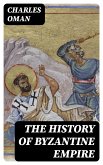In "History of the Eastern Roman Empire," J. B. Bury delivers a meticulous examination of the Byzantine Empire, tracing its evolution from the decline of the Roman world through its complex socio-political webs. Bury's narrative style is both analytical and engaging, characterized by rigorous scholarship and a profound understanding of historical context. He employs a chronological approach, interweaving political developments with cultural shifts, which sheds light on the intricacies of Byzantine governance, religion, and society-elements often overlooked in broader historical discourses. The work stands as an essential contribution to both historical literature and Byzantine studies, thoughtfully positioning the Eastern Roman Empire within the larger framework of European history. J. B. Bury, a distinguished historian and classical scholar of the early 20th century, was deeply influenced by the shifting paradigms of his time, particularly the surge in interest regarding lesser-known aspects of history. His academic background at Cambridge and his roles in teaching and historical writing are evident in his precise methodology and insightful perspectives. Bury's passion for exploring the Byzantine period was likely fueled by his recognition of its significant yet often marginalized contributions to European scholarship. This book is recommended for students, historians, and general readers eager to gain a nuanced understanding of the Byzantine Empire. Bury's engaging prose and thorough research make this work a compelling narrative that invites readers to explore the rich tapestry of Eastern Roman history, offering essential insights into how the empire shaped the course of Europe.
Dieser Download kann aus rechtlichen Gründen nur mit Rechnungsadresse in A, B, BG, CY, CZ, D, DK, EW, E, FIN, F, GR, H, IRL, I, LT, L, LR, M, NL, PL, P, R, S, SLO, SK ausgeliefert werden.









